#yeah. i rambled. what about it?
Explore tagged Tumblr posts
Text


what if i broke all the bones in your legs actually
#ramble#please let this be a fucking joke#i cannot imagine being this out of touch#YEAH IT'S ALMOST LIKE ART TAKES FUCKING EFFORT AND THE MAJORITY OF PEOPLE DO ENJOY IT ACTUALLY#the phrase 'labour of love' exists for a reason#i sat and watched my grad film on repeat for days when it was done bc i was so proud that my hundreds of hours paid off#I DON'T MAKE ART TO SIT AND LOOK AT IT#I MAKE IT BECAUSE I PUT TIME AND LOVE INTO IT AND I GET TO LOOK AT IT AND BE LIKE I MADE THAT WITH MY HANDS!!! AND MY BRAIN#GOD FORBID YOU PUT A SECOND OF WORK INTO ANYTHING IN YOUR FUCKING LIFE ANYMORE YOU USELESS FUCK????#i'm so sorry i'm unreasonably mad about this#is it crazy for me to say that you should have to do some things in your life?????? god forbid you read your own emails#what are you DOING how fucking LAZY can you be????#and that is NOT a word i ever want to use but this is the DEFINITION of lazy#kids with adhd aren't lazy. tech bros wanting the exact same things that people have worked years for at the push of a button are lazy#i actually need to go and put my face in grass i'm so upset#thankfully. basically every musician who saw this shut it the fuck down and told him he was an idiot so that's nice
2K notes
·
View notes
Text

We're drawing the idiots with traditional clothing from our countries? hell yeah, here's stobotnik as Argentinian gauchos!
Plus a very normal and not at all unhinged rant about mate (the thing they're drinking) in the tags.
#stobotnik#agent stone#doctor ivo robotnik#sonic movie universe#took some liberties because i wanted to keep their colors but yeah#now hear me out i've got a little ramble about that little thing they're drinking#so that's mate#so what's that? it's basically a hot drink similar to a tea but drank in a very special way#made with the yerba mate plant (contains caffeine so perfect for robotnik)#now the way this work is you pass on that little container thing (also called mate because why the hell not)#to whoever many people there are there#but there's only one person pouring the mate#so it always returns to them before they refill it with water to give to the next person#drinking mate when it is your turn doesn't take more than a couple minutes since it's not that much water because the dried yerba mate is#there. the person pouring the water also changes the yerba or adds sugar as needed#when preparing the first mate the person pouring it has to drink it#it's polite because usually the first one tastes awful so you know they take one for the team#i think obviously stone would be the one pouring the mate but since it's a constant thing he can't just give it to rob and leave#he has to be there and actually drink himself to know when to change the yerba#so you know. community. it's a very social thing#BUT THAT'S NOT ALL#there's a sort of mate language at play here#we all know it but i've never seen anyone actually use it#thing is depending on how the mate is prepared it can mean things#like if it's cold it's a way to say get the hell out#if it's sweet it means i love you#if it's very hot it means the person serving it is angry etc#stone would so do that to be passive aggressive towards other people#rob is like wdym? stone's mates are always great#also obviously we don't see it that way but if you want to get silly about it they're indirectly kissing
579 notes
·
View notes
Text




Vivid bad doves
#I finally finished this distraction of a project (hurray yippie) so I can finally be normal again (as if) So now any pigeon posting will be#pigeon yuri/yaoi like god (hatsune miku) intended#so anyways to the more important part: rambling about the rats#Kohane is a diluted brown old german owl. An is a blue T-check feral with a hint of homer which can mean nothing really#Akito is also a feral but he is barless (like Ena) and a ash-red (Unlike Ena) Not to mention pied (his ugly bleach) and with crest#Toya is a blue clean legged bohemian tiger swallow because I gotta get Toyas split hair in some way and yeah sure woe fancy breed that has#to be plucked for their appearance. I mean it fits Toyas backstory but equally I am sadly no Toya scholar#but now that I am done I will... Idk what I will do tbh but it will be soemthing impulsive (trust)#art#my art#project sekai#prsk#hatsune miku colorful stage#vbs#vivid bad squad#kohane azusawa#an shiraishi#akito shinonome#toya aoyagi#pigeon#prsk pigeons
600 notes
·
View notes
Text

⸢This story is for just that one reader.⸥
#im in my yoohankim feels nobody talk to me#asked the squad what kind of sky suited these bitched and they were like “dusk” and i was like “fuck yeah i love that”#but holy shit orv rewired the circuits in my brain especially these three and their sun moon star motif#i could ramble about them forever but aye I'll shut up now#i will never be getting over this novel#feel free to use the wallpaper for your phone just don't repost it or claim it is yours pls thank#yoohankim#orv#yoo joonghyuk#kim dokja#han sooyoung#doksoo#joongdok#joongsoo#myart#anime art#anime fanart#artists on tumblr#digital art#omniscient reader's viewpoint
2K notes
·
View notes
Text
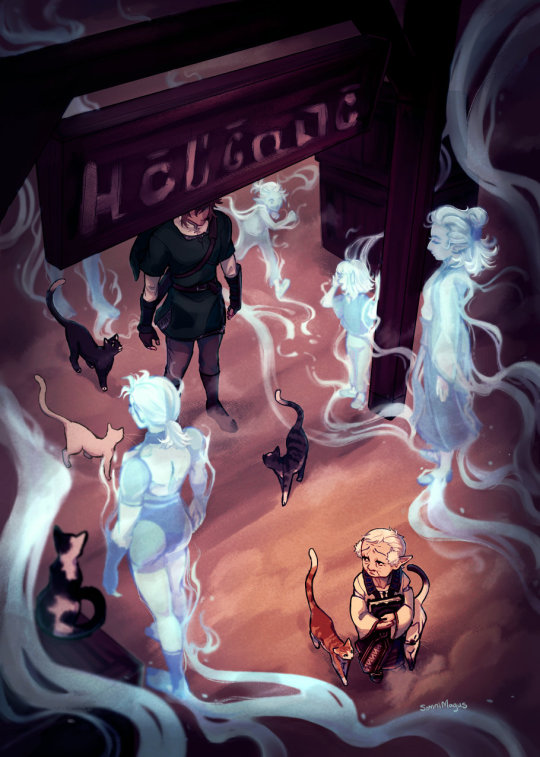
My page for @sheikahzine; about Impaz's duty to her village, empty of people and full of memories.
[id in alt text]
#legend of zelda#loz#twilight princess#loz tp#i'm still reeling that someone sent me an ask about this one.. that they took the time to find my tumblr and tell me they liked it#it really meant a lot; thank you to anyone that stops to leave comments like that. they make me happy#but yeah! here's the usual symbolism ramble:#i thought it'd be cool to have the 'spirits' flowing one way and the cats walking through them the other way#to kinda show the difference in life inhabiting the village in the past and present#link's face is covered because impaz was just waiting for 'the hero' so his clothes are what matters; not his face#and it (hopefully) gives a surreal and intangible sense to 'the hero' she could only hope would actually show up#you can feel free to interpret the glowy blue sheikah as ghosts or just as memories of the past! i couldn't decide either way#the one on the bottom left is oot impa since she's implied to be the village founder. so i guess she would be a ghost actually?#fan art#my art#project stuff#and ahhh the book-- everyone's stuff is so beautiful!!#especially the writing. some of the fics made me really tear up and some were so fun and clever. i really love them#a lot of them captured the sheer burden of the role of the sheikah; all of the time and grief and doubt#i know i always say this stuff about every project but. the people i get to work with in these are truly so skilled every time
4K notes
·
View notes
Text
don't think about watson coming back from switzerland with 2 suitcases and a crumpled hat in his fist. don't think about mrs hudson's smile falling when she realises there's only one of them. don't
#yeah im on a walk rn listening to dream sweet in sea major and im gonna write this when i get home#oh my god#imagine if one of the irregulars was in the kitchen and they just hear watson start to weep DONT TALK TO ME#jarring because watson is a military man and has nerves of fucking steel and he held it together the whole trajn ride back#do you think he looked at other passengers wondering what holmes wojld deduce about them#yeah ok jm writing this#new sillage will be up in the next week LMAO#not equipped for rambling#acd holmes#acd watson#sherlock holmes#john watson#granada holmes
458 notes
·
View notes
Text
Ideology of Exceptionalism and Gravity Falls; meta and character analysis

I had a whole ago read a post by @icanlife that had a quote by Alex Hirsch on Ford's greatest flaw, and wanted to explore what the flaw is, which is the ideology of exceptionalism; in the exploration, I’ll touch on what it is and how it is used in abusive relationships and cults, as well as how it drives multiple Gravity Falls characters and consequently how it impacts relationships between these characters, and how the show ultimately refutes exceptionalism.
Quick note here; I am not in any way, shape or form a psychologist nor have any formal training in psychology; this is written from my own experiences with this ideology and my own forays into psychology and trauma-informed learning. It is also written with a loose understanding that is likely not broad enough to cover all references to cults, extremist groups and abusive relationships.
The Ideology of Exceptionalism
First of all, we have to get through a drier bit, which is… what is the ideology of exceptionalism and how does it arise? Might be fairly obvious, but it is the belief that you are, or belong to, a group of exceptional people, thus more important and worth more than anyone else; ie, those who don't qualify as 'exceptional'. It is often a subconsciously learned ideology. Now, what qualifies one as exceptional can be extremely varied; generally it revolves around something that provides some form of privilege. Thus, it might be, as the main exceptionalist idea in Gravity Falls, 'intelligence', or power, or it can be such things as attractiveness, quantity of money one has, species, nationality, or skin colour and ancestral heritage. The ideology of exceptionalism, being by nature hierarchical, devalues, and at its worst, openly and violently dehumanizes those who do not qualify as exceptional.
For why exceptionalism occurs is an extremely broad topic, but I've personally found that, for exceptionalism revolving around intelligence, it's a result of a poor sense of self-worth, and having one's self-worth tied to what makes one exceptional. Poor self-worth itself (again, broadly) is a result of childhood trauma from a lack of positive affirmation and unfulfillment of the emotional needs of the child. Meanwhile, self-worth becoming tied to the quality of exceptionalism generally is a result of when positive affirmation was pretty much solely provided around their 'exceptionalism', especially when provided derogatory commentary, or a blatant example of how they would be treated if they aren't 'exceptional'. As a result of the general lack of affirmation, self-worth then becomes often solely reliant on the qualities of exceptionalism, as that is the only way for the child (and later, adult) to get affirmation of their worth, as well as out of fear of being ‘not worth anything’ like the examples of ‘non-exceptional’ people they have been given.
This is especially likely to occur when the child is a social outcast; the adoption of the hierarchical ideology of exceptionalism, and the devaluation/dehumanization of others often occurs subconsciously as an avoidance/minimization tactic from pain. This is to say, the child, and later the adult (if healthy self-worth is not established) goes 'it doesn't matter what the non-exceptional people say or if they accept me since I matter more than them because of my exceptionality'. It can even be taken further, that being shunned is part of one's exceptionalism, and becomes part of the qualifier of being exceptional. For instance, 'they just can't understand because they aren't exceptional and that's just a part of being exceptional'. This idea also neatly tailors into the part of the concept of being better then others means you are separate from others; this can be taken that someone who is special, needs to be alone to be truly special.
Obviously, exceptionalism is not a healthy coping mechanism for poor self-worth, as often such people constantly feel the need to prove and show off their exceptionalism to gain that affirmation and avoid rejection, which is stressful. As well, it often negatively impacts their relationships with other people as a result of the arrogance of believing that they are better than most others, or even deliberate sabotage due to their arrogance. This occurs as they flatten the complexity of human experience to black-and-white hierarchical categories of exceptional/not-exceptional through constant judgement of those they meet, and often refuse to engage with people who don't belong to their 'exceptionality', or even people they simply don't like, even if they technically qualify. Generally, those that they do like or have close relationships with, often due to being similar, are automatically labelled as 'exceptional'. Those judged as ‘exceptional’ also become privy to the open judgements of ‘non-exceptional’ others, out of a subconscious belief by the exceptionalist that the other believes similarly; something that may strain their relationship if the other doesn’t ascribe to exceptionalism. This all culminates in the exceptionalist being blind or even adverse to the diversity of experiences, which makes it difficult to create relationships and community outside of echo chambers of their own beliefs (if they can even find this), and subsequently, these people are often isolated and have very few to no close relationships with people.
However, all humans require connections with other people, relationships where one can rely on others emotionally and physically if needed and feel accepted; they also require to feel like they are worth something, that their life has meaning. Lacking meaningful connections and having a crippled sense of self-worth, a deep yearning hole is left in these people. Exceptionalism, especially as it is a narrative constantly pushed by Western society as it validates hierarchies, is then employed as a (often subconscious) trauma response to assuage this yearning hole, with arrogance and denial. And depending on the circumstances, it can be a very strong and definitive trauma response for people.
This isolation and lack of self-worth is catnip to abusive relationships, including cults and extremist groups. These types of relationships often heavily rely on isolating their victims or pulling them into echo chambers of solely the abuser’s rhetoric, to redefine what is healthy through gaslighting; as the exceptionalists are already isolated, this makes them extremely susceptible. They also often provide these people affirmation, and in these cases especially about their exceptionalism, thus confirming their self-worth, their 'specialness', while also providing them the connection they have been lacking, either through the cult community or through the abuser’s own presence. These emotional needs, which haven’t been met in a long time, if ever, begin to be fulfilled; something that abusive relationships and cults hinge on, rather than any form of logic.
Ideology of Exceptionalism and Gravity Falls
The main characters within Gravity Falls which are heavily ascribed to exceptionalism would be both Ford and Bill; this characterization deeply impacts the story and their relationships with others (technically the Northwest are another case regarding wealth, but less directly impact the storyline and thus tangential; Gideon also is an example, but as a mirror of Bill). With each of these characters I’ll go into detail within their sections on the way they began to ascribe to exceptionalism, and how it plays out later in their relationships; I will first begin with Ford, then move to Bill. Then, to cap it off, I’ll go into the characterization of Stan and the way Gravity Falls refutes exceptionalism.
Ford and Exceptionalism
Firstly, the quote from Alex Hirsch that kicked this whole baby off, as mentioned previously;
“Ford sees Dipper as someone who’s special like himself. That’s Ford’s great flaw, his arrogance is he believes that there’s special people, and everyone else. That human attachments are actually weaknesses. And the song and dance that he’s giving Dipper right now, is the song and dance that he gave McGucket, back when they were younger… ‘You and me are different, we’re better than everyone else. We have a path that no one else can understand, and only us can do this.’ It’s a very seductive idea for Dipper… Dipper is a smart kid, but Ford’s projecting. Ford loves Dipper because he sees someone who’ll tell him ‘yes’ to everything. Who’ll never challenge him, who’ll do a really insane dangerous mission.”
Very blatantly Alex Hirsch calls Ford out on his arrogance in the belief that he is special, in his belief in the 'lone hero' complex, in his belief in exceptionalism. And really, it should be no surprise that Ford does so, considering the way he's depicted as a social outcast as a child (other than Stan), and the way his parents have been clearly shown to be not particularly emotionally supportive (“I’m not impressed”); they don't provide positive affirmation except for his intelligence (mostly due to the possibility of money making through it…), while also actively comparing him to Stan who is derogatorily ‘not-exceptional’, and ‘worth less’. This all sets Ford’s self-worth up to be fragile, and other than Stan who wholeheartedly accepts him, he is isolated and invalidated; plus, the only other validation he receives is around his intelligence. All very classically fitting the profile for exceptionalism.

Image id: Stand and Ford when they were children, both clearly enjoying each other's company.
Ford’s belief in his exceptionalism catalyzes after the shattering of his and Stan’s relationship. Previously the twins are shown to do everything together, having a very close caring relationship; something unlikely if Ford thought he was better than Stan. Also, when Ford is talked to about his opportunities, Ford looks uncomfortable at the way they talk about Stan as inferior, compared to how he himself is being praised; but in the offer he’s simultaneously finally being validated, he’s being told he’s someone worth something, and he’s going to be someone worth something after this. And then the science fair incident occurs, and Ford loses that validation from his parents, from the judges and a future of more validation; after being promised validation and acceptance, it slips through his fingers. And in his anger of being denied that, it becomes easy to begin to slip subconsciously into the rhetoric the others have been feeding him; that he’s exceptional, that Stan isn’t, and he deserved to be recognized for his worth. So he breaks the relationship with the only person who accepted and validated him for who he is. With that loss of previous support, Ford becomes then deeply obsessed with proving his exceptionalism to the world to assuage that fragile self-worth, to become accepted, or even better, revered, confirming that he is someone of worth, someone special, like he was promised.
Ford’s obsession also doubly functions as a way to alleviate his guilt over shattering their relationship; if he’s exceptional as he believes, then he’s within the right to respond the way he did, as he’s worth more than Stan, he's better off alone, and he has a right to be angry over being denied that validation. As well, in much the same way as it is used as a way to alleviate his guilt over the end of their relationship, it is also likely used in a way to minimize the pain of being ostracized (although not directly depicted); afterall, Ford’s keenly aware and insecure about his social ineptitude and his six fingers as things that make him different from other people, case in point with his experience visiting Lazy Susans Diner. Thus it wouldn’t be unsurprising if he uses the idea of being worth more than those who ostracize him to imply it ‘doesn’t matter’ what they think. His ostracization by nature keeps him from generally forming close relationships, with the exception of Fiddleford (who much like him, is socially outcast, and intelligent) during his university days. As a result, he's isolated and acutely lonely, having lost Stan.

Image id: One of the missing Journal 3 pages in TBOB, detailing Ford's botched social interaction in Lazy Susans Diner. In the background is the print of his six-fingered hand.
In his obsession over being acknowledged, Ford, like many others who believe in exceptionalism, identifies strongly with the causes of his ostracization (his intelligence, his six-fingeredness) as part of, or wholly, makes him exceptional. It is obvious through his choice of study; with the grant he has been gifted, he chooses to revolve his work around the weird, the outcast, something that you see Ford gravitate towards being an outcast and deemed 'weird' himself (which in Journal 3 he openly talks about). Something that can be, much like him, framed as 'exceptional'. His work is even recorded in a journal that Ford deliberately chooses to put his six-fingered hand on the cover of. Intertwined with the way it becomes adopted into the idea of exceptionalism, is the keen loneliness from his ostracization and a deep desire to be accepted and a wish to find a community of other weird people.

Image id: Two pages from journal 3, labelled 'Myself', in which Ford is open about being weird, and a social outcast, while also noting his ambitions and that 'Gravity Falls, [is] the place that I fit in.'
Ford and Bill
All of this culminates in Ford becoming an incredibly easy target to manipulate by Bill. He’s desperate to be acknowledged (and thus accepted) by an authority figure so that his belief in exceptionalism is justified and his self-worth confirmed. And he knows he’s intelligent, that he's exceptional because people have told him so, but he just needs to prove it with something that shakes the world. And the grant is finally his second chance after the fair, but he's stuck, and the research is going nowhere, and he's in a town where he doesn't really know anyone and he’s so terribly lonely. And sure, he clings to his exceptionalism but if he can't even prove it then is he really exceptional? Is he even worth anything like he thought he was? And what about what he's left behind, rejected, because of his exceptionalism?
And THEN he finds an incantation and he ignores the warnings because maybe, just maybe, this will be his break to get that acceptance/validation he has been chasing his whole life?
And then it's better than that.
A god, essentially, shows himself to him, an ultimate figure of authority. And he tells him that yes, he is special, he’s worth more than other people, and Bill’s only showing himself to Ford because he is so much more intelligent than anyone else. Ford is suddenly getting his exceptionalism confirmed by a god of ancient knowledge, an immensely intelligent interdimensional being, and he’s also showering him with affirmations, specifically affirmations around what Ford's fragile self-worth is based on. And even better, he's delighted by Ford's six-fingeredness; he's not put off at all, it even becomes his main nickname for Ford, just like it used to be for Stan all those years ago. On top of it all, Ford's own social ineptitude doesn't phase Bill, another thing Ford is self-conscious about; Bill's own social ineptitude as he's not human probably makes Ford feel comfortable, knowing that's not expected from him.
Through Bill, not only does Ford find someone who validates his self-worth through intelligence and even confirms to him that his weirdness is part and parcel of making him special, he also finds someone who he regularly (generally) is in contact with, who enjoys talking to him and even banters with him familiarly. Hell, Bill even deliberately goes out of his way (literally possessing a whole wack ton of rats, then dream karaoke) to celebrate his birthday with him; how long do you think Ford has simply skipped his birthday since he had no one to really celebrate it with? The loneliness, beneath his arrogance and belief in exceptionalism, is being fulfilled; for the first time since Ford was a teenager, he's fully accepted by someone, social awkwardness, six fingers, exceptionalism and all.

Image id: One of the lost pages from Journal 3 in TBOB, the 'one thing led to another' page, with Bill and Ford singing karaoke and drinking together, both clearly enjoying themselves; Bill has an arm slung around Ford's shoulders.
So it's really no surprise at all that Ford fell for this, hook line and sinker. Hell, if I was in Ford's shoes I would fall for it just as hard. And I've seen a few posts floating around talking about how Bill is bad at manipulating, and no, he's not. He was able to pinpoint exactly what Ford wanted and needed, and provided that, was charismatic enough to provide that. Again, manipulation isn't about logic. It really isn't; it's about the emotional core in people, what people lack and what you can give them to slowly reel them in to sing your dance and song. And people will ignore vast swaths of red flags when you're finally being accepted, when you're finally getting your emotional needs met at least in some way or form. It's better than not having them met at all, such as previously. So Ford worshipping Bill is really not a surprise, especially as Bill deliberately stoked it.
All of this is part of why you see Alex Hirsch call Ford's belief in his exceptionalism his greatest flaw; because it allowed him to be very easily manipulated by Bill, and by its nature kept Ford isolated from others, evident by his arrogance in assuming he knows best and refusing to see other people who aren't as 'intelligent/weird' as him as worth getting to know, listen too and even reach out to ask help from, it's him believing he has to be the lone hero as someone whose 'special'. It's something that blinds him to the danger of his work around the weirdness of gravity falls because he’s desperate to seek a place where he and his weirdness belong, and it's something that plays out in each and every relationship he has because it's something he clings to so deeply. It's what cost him his relationship with Stan, who previously accepted him completely, and, as he's disinclined to form new relationships and as Bill actively strokes his paranoia (Trust No One…), ultimately further increases the hold Bill has over him. It's only Fiddleford’s presence as he works with Ford that allows him some form of outside reference and reprieve from solely Bill’s influence, something that Bill resents deeply and is clearly jealous and angry about, even if Fiddleford is helping create the portal. And it's ultimately Fiddleford, once he was aware enough of what was happening, calls Ford out on it, seriously jeopardizing Bill's influence over Ford; but Ford is too invested in the portal, in chasing his own ambition and caught up in Bill’s manipulation to take him seriously, until the incident with the trial, and Ford beginning to hear other voices then Bill.
Ford’s Exceptionalism and Wider Relationships
Now back to how it plays out in all Ford's relationships; we've already gone over it with Bill's influence, because it made him extremely easy to manipulate, and with his disregard of Stan in favor of validation of his exceptionalism. But Ford, as pointed out by Alex Hirsch, also exerts the ideology's seductive rhetoric to both Fiddleford and Dipper (who look up to Ford) in a similar way that Bill does with him (although there is a difference of it being used intentionally and maliciously, compared to subconsciously and earnestly, even if it is problematic). Ford, with his black-and-white view of exceptionalism, sees both Fiddleford and Dipper as people who are like him; 'exceptional', and so he treats them as such, and uses this rhetoric to coerce them into helping him.
For Fiddleford, the lure is how he can change the world, how he can be finally acknowledged if he helps Ford with the portal. And it works well; he willingly chooses to leave his own work and his wife and young son, to work with Ford. Much like Ford, Fiddleford himself is also a social outcast and regularly presumed less smart than he is, and he’s got a chip on his shoulder to prove himself, to gain acknowledgement and recognition from the world at large. Although Fiddleford has a family which presumes he’s not entirely lonely like Ford is, he also clearly has deep feelings for Ford, some which are hinted to be more than just ‘friendly’ feelings; it is likely the combination of the lure of validation and spending time with Ford, a kindred spirit that accepts him and an old friend/crush, that causes him to agree (afterall, it was Ford who made Fiddleford feel accepted and choose to stay at Backupsmore). And Fiddleford’s not even considered a partner, but rather an assistant to Ford due to Ford's arrogance, and he still drops everything to go! It’s more about their relationship and connection rather than validation, but that doesn’t stop Ford from espousing exceptionalism. And this is a distinguishing difference, because although Fiddleford would like recognition, he’s not there solely because of it; he’s not a believer in exceptionalism nor arrogant about his skills, and so, unlike Ford who is blinded by his obsession, he’s much more aware of the dangers of the weirdness of Gravity Falls. Thus, he's actively calculating the risks involved, and when he realizes there could be potentially devastating consequences of the portal, he attempts to talk Ford out of it; this fails due to Ford’s own denial and obsession over the portal. In the end, it all goes terribly sideways, and Fiddleford ends up losing everything he had; his wife, his son, his friend, his memories and himself to the trauma he had experienced at the invitation of his friend with the lure of validation and company, due to the memory gun he had created himself.
As for Dipper, much like Ford, he also has issues with self-worth (many of the episodes deal with Dipper finding self-worth; ie, the manotaur episode), has a physical oddity (his birthmark) and by far the trait he relies on most for worth is his intelligence (for example, in one episode he rubs it into Mabel's face over and over again in beating her in games). He's also extremely desperate to be recognized by authority figures as someone intelligent, case in point when he summons the dead after being made fun of by the government agents to try and show them that the information he's gathered is important after Stan dismisses his knowledge. This desperation to be seen as someone of worth from Dipper, much like Ford, extends to the need to be a hero, something he even says at the end of the zombie episode; yet, due to Mabel, unlike Ford he's not a lone hero, and Mabel also half the time acts as the hero.

Image id: Zombies crawling out of a crack after Dipper summons them; Dipper and the two agents look on in horror.
It all culminates in Dipper hero-worshipping Ford when he returns; really, no different than Ford worshipping Bill. And Ford clearly finds it extremely flattering; Dipper's attention and amazement of him feeds his exceptionalism. Exactly how Ford responded to Bill, Dipper is willing to do anything for Ford, excited too, in an attempt to impress Ford and be validated and accepted. And for Ford, that's an extremely heady feeling, especially as someone who has been constantly alone the last 30 years, especially when he had one previously confirm his exceptionalism all those years ago and stopped, and now someone is once again affirming that idea. And Ford doesn't have to be alone again, because he's found a kindred spirit in Dipper as his assistant, someone ‘just’ like him, someone who is exceptional. Because he sees himself in Dipper, he begins to espouse exceptionalism unconsciously, by praising Dipper's own intellect and adventurous spirit, assuaging his feeling of self-worth, while also telling him he's more important or better than others because of it.
And it's seductive to Dipper, because he wants to hear those affirmations of his self-worth, especially as he hero-worships him, but Dipper isn't sold on it, because it means leaving Mabel behind, it means believing that he's worth more than Mabel (and also, Stan, and all his friends he’s made in Gravity Falls). It's ultimately because of his relationship with Mabel that he rejects the ideology; he's not isolated the way Ford was with Bill, and he's not willing to break that relationship for that acknowledgement, because his relationships matter more to him.
Bill and Exceptionalism
Now of course, that's only on the Pines; what about Bill?
While it's obvious that Bill uses exceptionalism as a main manipulative tactic, it's not just an ideology he sprouts emptily; it's also an ideology he believes in, just like Ford, although it's less based on intellectual exceptionalism, and more on power and 'weirdness'.
This most distinctly can be seen in Bill's denial about what happened to his home dimension; Bill's belief in his exceptionalism occurs as a pain avoidance tactic from killing his whole dimension. Bill was clearly a social outcast within his dimension due to being able to see 3d; he's not accepted, and not trusted, to the point that there is medical intervention to make him blind. That's a deeply traumatic experience that completely erases one sense of self-worth, where one’s sanity is called into question by your parents on something that is not harmful, that's beautiful and you just want to share with them. It's a deep and clear rejection of who Bill is, and his ability. As a result, out of a desperate bid to be understood and accepted, he ends up trying to show them the stars. And it ends up killing everyone.

Image id: Page of TBOB, on 'The Early Years' which notes that Bill was an oddity for seeing 3d, something that was illegal to speak about. Bill frames it as something that made him 'special' and better than all the others.
Traumatized, and originally rejected by the dimension, he instead weaves an excuse of exceptionalism; that it doesn't matter what he did to them because he's exceptional and he's worth more than all of them because he can see 3d, because he's powerful, so he shouldn't/'doesn't' feel any remorse about it. With such a traumatic result of trying to be accepted by people, he rejects the idea of trying to be accepted for who he really is; instead adopting a facade of a monster that he believes he is (and eventually, becomes).
Even if he clings to the delusion of exceptionalism, and shuns attempts to find true acceptance, he still wants it; and that's where his henchmaniacs fit in, as they're all, as Bill's noted when trying desperately to get Ford to join him, weird; each has something 'wrong' with them, which is why Bill accepted them as his lackeys (although it's not like we know the context around these). It's a surface-level acceptance however, one more predicated on fear than emotional acceptance. He's taken his 'weirdness', much like many do who believe in exceptionalism,as ‘part of what makes him exceptional'.
In the same way that Ford wants to show the world that he's smart and intelligent by building the portal, Bill does so by wreaking havoc and taking over existences as a way to show the world that he's powerful, that he's someone to be reckoned with, that he's not someone to be ignored because he's someone who's worth more than others. If you can't be loved and accepted, then being hated and feared is better than being ignored; acknowledgement at least approaches acceptance, it's validation of some sort of worth. It also functions as deliberate self-sabotage of his morals, by proving that he is the monster that killed his entire dimension; if that's what he is, then that's who he's going to be, because if he wasn’t, then he has to come face to face with his remorse over what he did to his dimension and his whole house of cards around his exceptionalism and not caring collapses. So instead he keeps feeding the delusions the denial, and lies and lies and lies and keeps lying to ignore all of it, to wrap himself in this shroud of exceptionalism and brutality as a way to function. And it somewhat works, because he's mostly deluded himself about it all, even if subconsciously he knows.
And of course, this display of Bill's exceptionalism is what brings Bill to earth, to Gravity Falls, and to manipulating humans. In meddling with earth and humanity, beyond Bill's goal of taking over earth and fleeing his own unravelling dimension, he also enjoys reaping the benefits of being worshiped by humans, who find him awe-inspiring. Their amazement of who he is, and Bill's own posturing and manipulation of people leads to Bill literally forming cults (ie ciphertology) or having apprentices that worship/find him (to varying degree) inspiring; all reinforcing his feelings of exceptionalism.
Of course, Ford numbers among these people; he praises Bill and worships him, as he's played like a fiddle by Bill, because his self-worth and belief in exceptionalism is fucked up in a way that perfectly resonates with Bill’s. Because it's the exact same types of issues around self-worth, around being an outcast, being weird and wrong physically, and yet at the same time gifted. And Ford clearly is incredibly lonely and yearning for acceptance, but so is Bill; since the beginning he's been trying to find someone who would accept him, even if he's given up on it. And for his song and dance to entice Ford in, he pretends he's not crushed dimensions for fun, that he's not a 'monster'; a version of him he buried after he had tried to show his parents the stars, one that he occasionally resurrects and puppets around for manipulation (all lies are better when they have a grain of truth). And this version of him is worshipped, but above all is accepted, is loved by Ford. The softer parts of Bill, even if they are still weird as fuck, the parts that were never far beneath the surface for all his deluding, become loved by Ford. Much as Ford becomes hooked on Bill’s praise, Bill also becomes hooked on Ford's genuine love and care. It becomes personal, unlike any previous ‘inspirations’ and Bill over time gets to the point that he feels accepted, safe enough with Ford to share about his dimension much more close to the truth then he did with any of his henchmaniacs. He becomes vulnerable with Ford, in response to Ford’s own vulnerability with him. He’s finding acceptance for the first time in his life around the softer parts of himself, not just the feared acknowledgement that comes from his dimensions conquering; much like Ford is finally finding companionship and acceptance with Bill, not just only intellectual validation. Bill's also for once, not just self-serving; he cares, and goes out of his way to take time with Ford, even celebrating Ford's birthday (in the unique way he does things), both with the rats and the karaoke.

Image id: One of the lost Journal 3 pages in TBOB. Ford recounts Bill talking about the destruction of his dimension, and calls himself by implication a monster.
They're both fulfilling each other's emotional needs, needs which both of them have struggled with most, if not all of their lives (although their relationship is certainly not healthy, considering it's codependent as fuck, riddled with exceptionalism and oodles of power imbalance issues). And suddenly, against Bill's plans, Ford's no longer just a disposable pawn, but someone Bill wants as part of his team, someone by his side, closer than his henchmaniacs are. He's unwittingly fallen for Ford, and so when everything goes sideways in his plan, and Ford swears it off, suddenly cutting off their relationship and that acceptance Bill had finally felt, he spirals into grief and anger from the rejection. As a result, he becomes extremely abusive to Ford in desperate attempts to continue their relationship, and ultimately he becomes obsessive over Ford joining him again as Ford continues to refuse, as evidenced by both Weirdmageddon and the Book of Bill.
Stanley Pines, and the Refuting of Exceptionalism
Exceptionalism, being a negative driving factor behind many core character dynamics, is ultimately refuted by the show. This occurs multiple times over the show, such as with Mabel in the Pioneer Day episode, especially compared to Pacifica, but mostly through Stan's characterization. Stan is someone who has been since the beginning characterized (if lovingly so) as someone who is a failure by societal standards; he’s an older man running a run-down tacky tourist shop to swindle gullible tourists out of their money, has multiple divorces, has an ongoing feud with a literal 12 year old, clearly has had multiple mishaps with the law (some ongoing), is generally pretty self-serving and is extremely lonely and really had no close relationships until Mabel and Dipper showed up. He's not exceptional; he's not even what we would consider 'decent' enough to have a 'typical, hard working job’. In short, he’s a failure, a stark difference to the idea of 'exceptionalism' that characterizes Ford. If he's gifted in any area, it would be charisma (debatedly), not anything else.
But it's still Stan who rebuilds the portal from literally only one journal (not all three!) and gets it to work. It even seems like he only needs some codes from the other two journals when he does get them, suggesting that he was able to extrapolate from what was left and the first journal’s blueprints to fix it entirely, something that is extremely difficult and technically complicated (Ford, Bill and Fiddleford all worked on it together!). Stan's able to do it, even if it's been shown he's not 'naturally' gifted in that area. And it's something he does as a result of his deep care for Ford; because even after their fights, he cares about Ford and wants to right his wrongs, believes he should, because of his whole life of being defined as a failure and even worse than that, screwing up his ‘exceptional’ brother’s life. And he’ll do it even if that means learning how to build an interdimensional portal, even if it takes up thirty years of his life doing so, and he doesn't waver. Much of this is connected to his own complexes around being deemed a failure compared to Ford, having failed to succeed in his life, and how he feels that he needs to atone for screwing up Ford’s life, now for the second time; but beneath it all, he also cares. Much like Ford, he's extremely lonely, but he's not blinded by Ford's arrogance, and as a result he wants to make sure Ford's safe, because that's what he used to do, they’re twins, they grew up together, they once they had fully accepted and cared for each other, and dammit that still means something, and Stan hasn't found that depth of emotional connection since. So if possible, he wants to rekindle that closeness they had, but first, he needs to bring Ford back.
And in the end, it's not Ford's own special gun he built using his intelligence that 'kills' Bill. It's Stan, someone who Ford had long ago broke it off with in search of validation of his exceptionalism, someone who both Ford and Bill labelled as 'not-exceptional', who defeats Bill. It's exceptionalism's devaluation of people who are 'not-exceptional' that causes Bill to underestimate the Pines beyond Ford, and it's only when Ford put aside his exceptionalism and his refusal to accept and trust 'non-exceptional' people, that is, trust Stan once more, that causes Bill to end up defeated by Stan.
In the end, it's not about who's 'smarter'; it's a reminder that everyone has different skills and are better at different things, but that doesn't diminish one's worth or value, and that just because someone isn't naturally 'gifted' in an area doesn't mean they can't learn or use different ways to get around obstacles. Ultimately, it comes down to that no one is worth more or less than other people; exceptionalism is a lie. It’s a lie and an excuse, and it's certainly not a healthy way to assuage one's poor self-worth. What does matter is creating positive healthy connections with other people, and caring about them. This creates a community where you can be yourself and be emotionally fulfilled through these connections; and when opposition does arise, you become able to fight it together, and fight so much stronger than if you are alone.
And by the end of the show, you see that. Ford begins to let go of the ideal of exceptionalism and its black-and-white categorization; finally recognizes his own faults around prioritizing validation of his intelligence and exceptionalism over his relationships, and finally, after all the years, chooses to create and rekindle positive relationships with people, trust people, and make amends. And in the end, he goes sailing with Stan, prioritizing their relationship, finally fulfilling their childhood promise.

Image id: One of the pages written by Ford into TBOB. Ford refutes Bill's idea of happiness, and says he has finally found his own happiness, and it looks like the photo taped in, of Stan, Ford, Dipper, Mabel, Soos and Wendy, all smiling together.
TLDR: Exceptionalism, an ideology of categorizing people into being special and worth more vs plebian and worth less, is a trauma response and subconscious ideology that characterizes Ford and Bill’s lives, deeply impacting all their relationships as it is used to coerce people into doing what they want, makes Ford easily manipulated, and breaks relationships through their arrogance. It is ultimately denounced through the way Dipper chooses to reject Ford’s offer and his rhetoric of being exceptional, and through the way it's not Ford’s intelligence, but rather Stan, who has been labeled as 'not-exceptional' and a failure at life, that defeats Bill through trickery. It's a reminder that everyone has worth, and no one is worth more than other people, even if one may be gifted in certain areas; the ideology of exceptionalism is fragile and a lie. In the end, creating a caring, loving community around oneself is where strength truly lies, as is seen with the deep care and love the characters have for each other, and the repairing of Ford and Stans relationship.
Thanks to the lovely @eshtaresht who deigned to beta read this monster of a post for me
If you enjoyed this meta, (first of all if you read all this you're a champ!) I've also done another gf meta post! (It's shorter I swear)
#gravity falls#ford pines#stanford pines#bill cipher#stanley pines#stan pines#hugin rambles#hugin rambles gf#journal 3#the book of bill#thisisnotawebsitedotcom#billford#fordsquared#gravity falls analysis#gravity falls meta#book of bill#tbob#christ its so long whyyyy#also oh nooo i wanna do another thing but SPECIFICALLY on trust. gravity falls is ultimately about strength in community and hnnnghhhhh#that makes me wanna cry#also i had so many thoughts. also on the denial part of exceptionalism??? oh baby Bill fucking LISTS it in his book#like sir. please#anyways i love media analysis and im totally normal about all these characters#also like Fiddleford is. like. yikes man.#anyways uhm. does dropping a 6k essay post make me sexy? please say yes (i HIGHLY doubt it#sheesh who's got time to read all this... psssspsspspp theres PHOTOS that TOTALLY dont have more reading in rhem nawwww#i totally dont know what ur talking about mhmmm#if youre like is this about gifted kids- yes. yeah. i just didnt name it. its also about wider things but. yeah#also. unofficial title? Gravity Falls and Gifted Kid Issues an analysis#oh boy sure hope my post about gifted kid issues is a hit on the gifted kid issues site
727 notes
·
View notes
Text
Maybe it's the eternally distrustful loveless child in me but idk something about the way DC has been writing familial relationships in recent years rings so false to me. There's no room for the complex, nuanced, unnamed relationships Batman and Nightwing used to have, nothing like the warped mother-daughter-sister thing Barbara Gordon and Cass Cain had, nothing like Superboy's weird obsessive hero worship/bone-deep dread of his clone fathers or Max Mercury's weary undefined protectiveness of Bart or Wonder Woman's dogged loyalty to her little "sisters". Cause — for me, at least, I know I actively seek little moments of connection in stories; when I write or when I read it is to seek comfort. I think that's why DC has made this shift. Readers like me gravitated to those little warm moments, and DC noticed that we did without stopping to think about why.
But there's a point at which I notice diminishing returns of comfort from fluffy writing — it ceases to register as real. It's too good, too saccharine, too empty of any of the pain and frustration it takes to express genuine love for the other person. It's all hand-holding and no sweaty palms. It's so easy for someone to say they love you. It's so easy to see when it's all just words. And part of this is, yeah, bad writing; all that stuff about show not tell. They're trying to tell us these characters care about each other without giving us any real proof. but. idk. I need my love to be real. I need to feel the bones behind each embrace. I can't accept affection without struggling my way into it. Honestly I'd rather get a grim gritty Batman who forgets he HAS kids until they throw themselves into the line of fire than a milquetoast helicopter Batdad who tells his kids exactly what they mean to him without actively being in a state of bleeding out.
#idk don't listen to me i haven't read any comics closely since they killed alfred#but what i see in screenshots makes me. incredibly dissatisfied#maybe love is all about the striving!!!! maybe it's about the blood under your nails as you claw your way back to your beloved!!!!!#maybe it's hugging your dad and all you can think about is how stiff and unwieldy it is around the body armor and utility belts#y'know#and i DO enjoy wayne family adventures. it can be nice. but yeah i can tell that i would not endure it if that was all i had to read#dc#oli rambles
1K notes
·
View notes
Text
I’m just gonna say it straight up; most of my selfship mutuals ship from sources I had never even heard of until I met them. But that has never made me care any less about their ships. I don’t need to know the source to love seeing people happy with their f/o! Some folks have told me they felt intimidated to interact with me because they ship from a different source, and I’m like—nooo, please don’t feel that way!! I’d adore your ship just as much even if we selfshipped from totally different worlds. Love is love, and I’m always here to cheer you on. 💖

#moxie rambles i guess#selfship positivity#but yeah tbh it’s not that big of a deal for me#some people act like they have to selfship from the same source in order for me to like them#and I’m like…. what?#no but in all seriousness just tell me about your selfship and the source#I’ll understand in the best I can#and heck I might even be willing to get into the source too for you
300 notes
·
View notes
Note
May I ask what were the best transformers media you ever saw/read?
Well Transformers Prime, Transformers 1986 and IDW comics are having the first place that’s for sure
And then the second place is kind of shared by Fall of Cybertron, Exodus, Prime wars trilogy, Robots in disguise(2001) and Transformers One.
The third place goes to G1, Animated, Earthspark, Armada, War for Cybertron Netflix series, Aligned Robots in disguise, Bumblebee, Rise of the Beasts and Cyberverse because I only liked some little parts of them.
And then I also saw some of the Bay movies, Victory and Headmasters and didn’t like them at all.
Separate first place for J-Decker. It is not exactly Transformers but it is a show about giant robots and I loved it

#call me weird for placing cheap ugly shows above Earthspark and Animated#but the thing is#I have when the whole narrative revolves around human kids#*hate#I’m allergic to them#Prime wars trilogy had one of the worst face rigs I ever saw#but it also had Overlord teaming up with evil Rodimus and Megatron being funniest mf alive#Armada is straight up infuriating imma be honest#Armada is like#Au where all the weapons work only once and then just create some glitter#I actually have SO many thoughts on Armada. like. as a writer#the way they keep reusing the same plot 3000 times is borderline impressive#OH War for Cybertron from Netflix was such an experience!#It was so painfully boring and stupid sometimes#but the other times. ooooouuufff. The scene where some nameless decepticon gives Megatron a little tour to show him how him and his friends#-work so hard for the cause??? THAT SHIT HIT HARD#….also I pretty much only like the Quintesson apocalypse arc from the entire Cyberverse#Transformers Victory is fun until you actually hear them speaking#the concept of Star Saber adopting a human child and raising him and then#going to human school as his legal guardian being like ‘yeah sure I can sign all your tiny ass documents’#it’s hilarious but unfortunately all the writers of that anime were snorting cocaine because WHY all the characters talk like that#Animated was fun for me only near the end. Idk what to say. I’m not a fan of any drama centered around humans#things got interesting when Cybertronian government got involved#Earthspark is WHOLE giant topic ahahah. I liked Twitch. sometimes. I also liked Grimlock while he had voice lines. Prowl was fun.#everything else needs and essay haha I don’t wanna annoy anyone#OH I also watching Tf Cybertron right now and this shit is UGLY. they have NO RIGS. THEY HAVE ONE EXPRESSION EACH#but for some fucked up reason I love it. they got the guy named Landmine who only can have (-_-) face.#their Megatron actually respects Starscream so far and regularly gives him positive reinforcement??? I heard words ‘excellent job Starscrea#and went WAIT WHAT#Anyway. If you ask me to ramble about media you get a word tsunami. I have a lot to share
305 notes
·
View notes
Text
I'm loving all the discussion about Melinoe's anti-human prejudice, but I don't see anyone discussing my favorite, so u get more of my rambling. I also got these screenshots from YouTube so you get sketchy Hades, but I actually only just got this dialogue in this patch haha (I forgot to screenshot it myself).
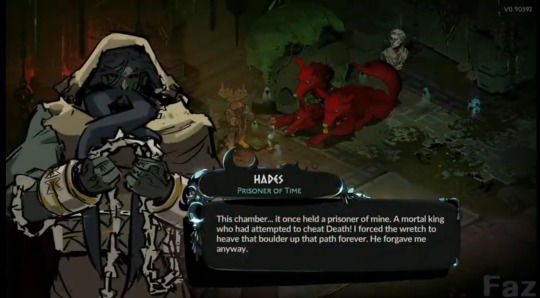
I'm obsessed with this bit of dialogue because it houses some beautiful Hades character development. One of his big flaws that caused like 75% of the problems in Hades 1 was his eternal punishments. Orpheus and Eurydice, forced to be apart. Achilles and Patroclus, also forced to be apart because of Hades contracts. And in this case Sisyphus, being doomed to always push up the rock.
Hades was convinced that they deserved their punishments, that they could not change, so they should never be free. Zag had to go through a bunch of hoops to change their fates, and Hades just grumbled through it all. But people can change, Sisyphus is a prime example of that. The way Hades' voice actor says that last bit "He forgave me anyway" just murdered me.
What an emotionally pogninent moment from a man who has realized his mistakes, but it's too late (to him at least), and now all he can do it stand in chains, in a prison he made, drowning in his regrets.
And then this is how Mel responds:
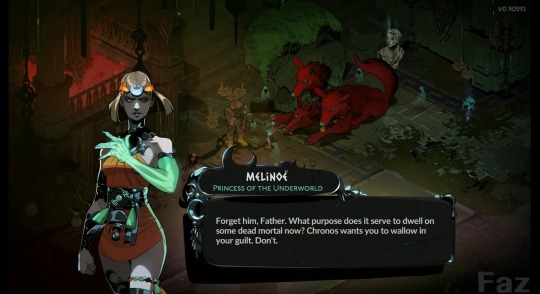
I just, omfg Mels nooooo babe, your Dad has just had some brilliant character development, what are so saying.
She is so dismissive. She totally missed the point of what he was trying to say. There's like no thought that went through her head, just "fuck that dumb mortal, don't feel guilty dad." Mel doesn't even try to even slightly engage with it, the moment he mentions a mortal, it becomes unimportant.
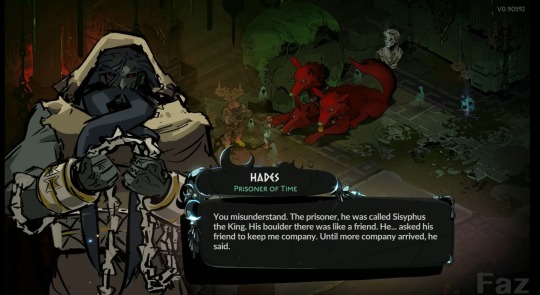
Hades, while blatantly disagreeing with her, doesn't exactly reply to her dismissal of Sisyphus. Which makes sense I doubt he wants to really argue with her and the context of these chats he is trying to get her to leave quickly considering their location.
But he does name Sisyphus here and reinforce the fact that he was a king. Which I note because Mel just called him "some dead mortal". And he appeals to a much more emotional thread with the whole thing with Bouldy, something Mel would understand a bit easier.
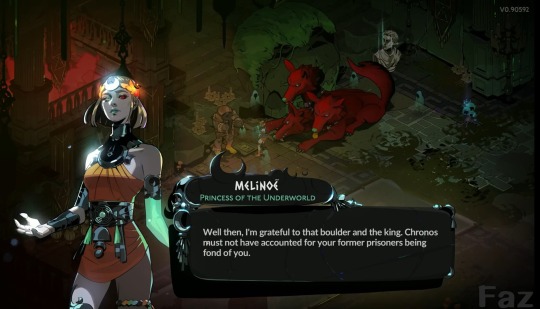
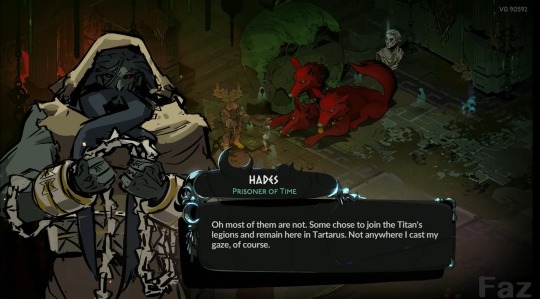
And Mel does call him a king in response, which while not his name, is more personable than "some dead mortal". But ultimately, she respects him because he was kind to her dad, not because she remotely comprehends the emotions and regrets that Hades is feeling with this character development.
And considering what else we know about her, I think it's very safe to say she still thinks Hades shouldn't feel guilty about anything. That this mortal is ultimately unimportant and deserving of his punishment.
But yeah tldr, i find it endlessly hilarous how Hades has this lovely moment of self reflection and then Mels immediately dismisses it with a simple "fuck that mortal".
#hades#hades 2#hades game#melinoe#i would say never change my girl but no u 1000% need to pfft#but yeah this was also my excuse to ramble about Hades#i genuinely love to see how he's changed for the better since Hades 1#and hes in the group of gods that seems truly regretful over what happened to Prometheus#its just nice to see :)#good for him#hopefully Mels wont be a bad influence lol
610 notes
·
View notes
Text
While I do think using the four sword causes some bad physical/mental side effects, I ultimately think that the biggest drawback ends up being that none of Four’s colours ever do what he wants unless it’s a life or death situation. Four has a lot of work so he decides to spilt to get everything done on time. It does not go well.
Red and Blue both run on emotions so they immediately get distracted by whatever’s more interesting and leave. Red might eventually get back on track (if he remembers) but there’s still a 50/50 chance that he goes “oh but I don’t wanna do that now.. hope the others do it for me! <3”. Blue’s better at remembering but if the conditions for doing The Task are slightly Off it’s going to make him want to rip his own hair out so he just calls it quits. Green and Vio are more likely to actually get stuff done but the second someone asks Green for a favour he’s gone. He’ll end up spending the entire day running around delivering pastries or something cause people keep asking him for things and hes incapable of refusing. Vio will spend thirty minutes coming up with some sort of convoluted loophole to avoid The Task before disappearing into the woods for the next three days. He could’ve completed The Task in those same thirty minutes but he just didn’t feel like doing it in the moment. Four eventually reforms and literally nothing had been done. The real reason he keeps the four sword a secret from the chain is because he’s embarrassed about the fact that all the colours are literally so fucking stupid on their own
#linked universe#lu four#Lu colours#Lu colors#putting both spellings cause I’m not american but that’s the tag usually used and I’ll die if it’s not organized#this could technically classify as only a FS post but eh#Four’s in the brain so he’s going on the post#it wouldn’t be. impossible for him to get stuff done when spilt#it would just be very very hard. We have to balance it out or he’s too powerful#people also need to acknowledge that Red’s a little shit more often#dude saw Blue frozen in ice and made two jokes before his new fairy friend was like UNFREEZE HIM DICKHEAD#red would no give a shit if his goofing off caused Four problems in the future#that’s sort of what I mean when I say that him and Blue are all about emotions#those two only think about how they’re feeling in the moment rather than how they’ll feel in the future#which is why they won’t do stuff that they consider boring#Green and Vio actually think about how things will affect them in the future which is why they’re better at getting stuff done but also#they’re both Link so yeah it’s not going to go well#Vio knows that not doing things will have consequences but he has a chronic case of not giving a fuck so#anyway im rambling. they’re all useless. send post
182 notes
·
View notes
Text
Mermay, but make it about NikPrice
a/n: mcd (?), abrupt ending, bit of eyestrain in some of the panels
special thanks to @karlachismylife @jgvfhl @on-a-lucky-tide for the inspo and vibes :3
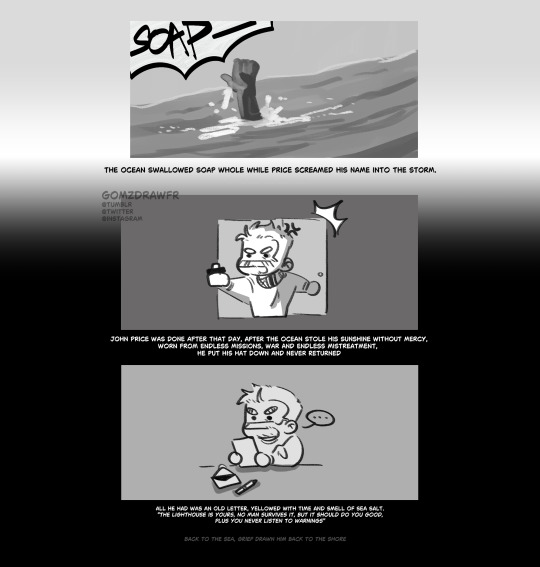

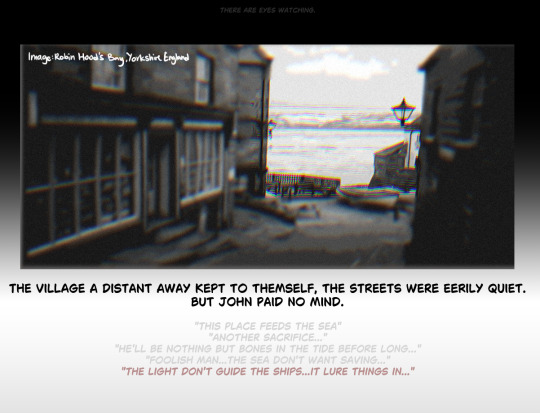
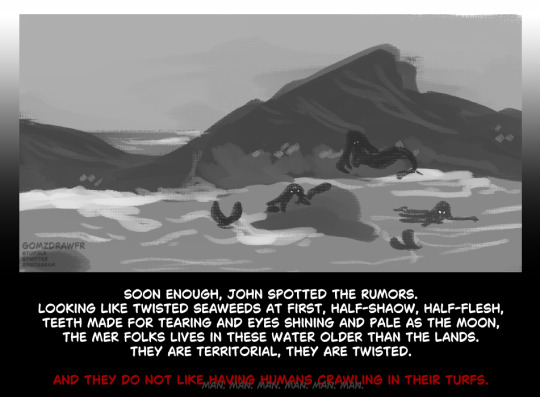


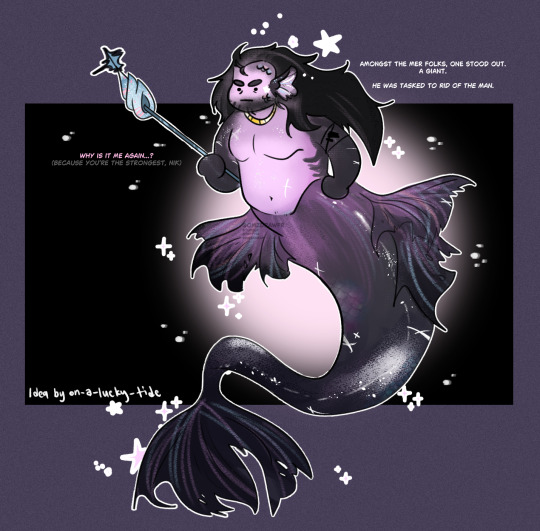


References used:



#i will now ramble about what I wanted to talk more about#which isnt much but its just funny thing nik does to seduce Price#no Price does not become a mer in the end but Nik does become human#you must be wondering aint no way the rest of the mer are okay with it and honestly they gave up#they did tried to recruit another mer which was Raven to take Price out#but Raven is also entranced by Price and was like nah this human is chill let him stay#Ghost is also a mer....i'll leave that to your interpretation to link the lines...#uhm but yeah! big project for me i think? bcuz ive never done comic at this level#IT IS HARD#it prob also suck but its whatever KAJSFDHLJSDFD#i actually did had a lot of fun doing bg study :) wanted to make it look painting ish#gummmyart#doodle#mermay 2025#np mer au#nikprice#captain john price#john price#captain price#cod nikolai#nikolai cod
263 notes
·
View notes
Text
So here's my problem.
And it's not about Nandermo, not exactly anyway. Because I didn't expect Nandermo to become textual until the very end, if at all. The show kept making it clear that they liked their ambiguity to keep the relationship on the razor's edge, and Paul Simms made it clearer and clearer that for some reason (put a pin in this) he just couldn't see their connection as a sexual one.
But I frankly don't care about that, because if anything is canon in this show it's that the vampires will eventually fuck everything, and Nandor canonically fucks his other friends. More importantly, their connection was always the emotional core of both characters. And Paul always did say he saw their relationship as a romance, if a strange and non-sexual one.
So I figured we'd maybe get Nandor confessing that Guillermo meant a lot to him (and immediately walking it back a little), or Guillermo confessing how lost he feels without his vampire dream and Nandor offering him a place. Maybe an ambiguous, could-just-be-queerplatonic-partners 'I love you'. Maybe just the hug they kept teasing for three or four seasons and never got. We got like...half of two of those, in episode 10, so I guess that's a wobbly semi-fulfilled thing by my definition of it.
But it's not the Nandermo of it all. It's the Guillermo of it all. And how this final episode seemed to almost mock Guillermo's place at the emotional core of the show.
And the Guillermo of it all is why we never got the Nandermo of it all.
Shadows has vampires doing absurd-ass things, but every character also has things they want and feel, and there are various amounts of emotional ink spilled about it. The show has found space, sometimes very poignant space, to take that seriously in between the piss and sex jokes. The vampires change very slowly and in spirals, they repeat a lot of their old issues that stem back even to their mortal lives. But they always try.
And things do change in the vampire house; that is not the same household from the first season. Every single character, right down to the Baron and the Guide and Derek, are in different and better places than they were before the show began. They've made progress in their individual desires, and a lot of that is due to the improved connections they have with each other, connections we've watched them foster. A lot of the time it's because they're talked about as a found family, something Guillermo started and Guillermo believed before any of the rest of them did.
---
So where is Guillermo this season? Our human point of view, our dynamic character, the character who has a dream and wants something more than any of the others? Whose dream drives the storyline of the entire show?
Guillermo has chosen to be human, and he thinks he can't be part of the household if he's not a vampire. We watch Guillermo try to throw himself back into the human world trying to make up for lost time - to the point that he forgets the person he called his best friend, the people he called his family, in a way I think we never fully resolve. He thinks he's thriving, and he doesn't even seem upset about leaving the others behind.
We watch him revert (and that's fine, people revert sometimes) to the same waiting lapdog he was when we started the series. We watch him realize that and he says no. Nandor stands up for him, and feels better and more fulfilled in doing so, and that's a great capstone for Nandor and Nandor's own tendency for selfishness. And that's excellent. Episode 10 was a great start for all the ground they had to cover.
Nandor offers for Guillermo to be his partner in crime. His sidekick, but Guillermo expressed that desire back in season one so it's not an insult inherently. But here's the problem. Here's the part of Guillermo that has frankly always been a problem, because I thought it's something the show was eventually going to cover respectfully, and instead it was always part of the joke.
---
Guillermo is someone who made a decision sixteen years ago as part of a very young man's desire, to be respected and have cool powers, to live forever, to see the world. (He somehow thought being a vampire, and only a vampire, could get him those things but that's a rant for another time.)
That young man has grown up. He's in his mid-thirties, he has a body count. We've watched him at various times be empathetic, clever, cunning, and brave. Also extremely sexy in bodyguard gear. (And for some reason, the show keeps wanting us to forget that for a season he was extremely competent and badass and sexy pretty much all the time, and he seemed thrilled to be in that role, and he didn't even care about being a vampire if he could protect Nandor in that way and be regarded as 'part of the team'.)
Then Nandor dresses him in a stupid cowboy costume, and gives him a sidekick name ending in 'Kid', which he seems less than thrilled about. They all still talk about him the entire episode as if he's a disobedient child. The vampires speculate if Guillermo is having a fling with the crew, but no - Guillermo's had one boyfriend, who we saw him hug once and nothing more. Despite living in a house for fifteen years that is openly raunchy and shameless, he seems like a character designed to be both desexed and humiliated, and they never expand on the reason why.
(And if Guillermo were ace it'd be amazing, hell it's my headcanon at this point, but I don't think that's what they're going for. I think the show just desexualizes Guilermo. As a matter of praxis. For some reason.)
And the show has done this more and more to Guillermo in the later seasons. Nandor says he could steal original!Freddie easily from Guillermo if he wanted to. The vampires laugh at the thought of him being a vampire - "a little bat pooping everywhere," and Guillermo's time as a vampire has him basically feeling no different in his sexuality or, after a very brief moment, his confidence. Even Nandor's big climactic moment in Episode 10 has him saying that just because Guillermo isn't as cool or hot or interesting or strong as Jordan (or Nandor) doesn't mean Guillermo deserves to be treated poorly.
Look, I don't know if it's because Harvey Guillen is babyfaced, or because he's fat, or because he carries a different energy to his masculinity. Or because it's great to talk about gay sex and being horny, but writing a gay relationship is just too hard. Or some fun combination of all those things.
But I keep thinking about everyone freaking out when Nandor swooped into the collapsed floorboards to save Guillermo in season 4, and everyone freaked out and swooned. And Paul Simms expressed that as "[Nandor] has to save his little buddy."
Guillermo is a grown-ass man, with a desire to feel powerful and special and accepted, who Nandor sees as his little buddy. (Who everyone in the house sees as their little buddy, and it's nice he's part of the family, but...) After every emotional beat that makes them seem like equals with a special connection, he reverts to the less-cool sidekick who makes Nandor feel special and important. And Guillermo's prior devotion to Nandor - not to vampirism, not to a job or promotion, to Nandor - changes to other things, but Nandor never figures out why that hurts him so much. And for some reason the deepest bond of the series just isn't sexual, the showrunner just can't see it that way, in a house where everyone's fucking but not you Guillermo.
We're at the end of the story, and that's our punchline.
---
And we don't end on one of the points where Guillermo is asserting himself as someone who deserves to be taken seriously, and given the things he wants - and the show has had plenty of those moments, all of which seem to be building and evolving his relationships over the years.
We end on Guillermo being told that suddenly, the documentary is packing up without any fanfare or clarity on what they were looking for in the first place. We get Guillermo stumbling for clarity on what it all meant, what the point was for him and what his life is going to be now. We're told over and over again the documentary (and Guillermo, and the viewers) needs a satisfying capstone, needs emotional closure.
And the vampires tell him to shut up. And they tell him this has all happened before, and none of it is special to them. ("No human is special," Nandor said several episodes ago, and never went back on it.) And they tell him to do a little dance for their amusement, and Colin recites some pithy lines. And every attempt to take a moment to care about Guillermo's journey, or the core of his character and what he needs, is turned into a joke for him and for us.
Guillermo's looking for a point to it all, for some kind of fulfillment, and there wasn't one. And everyone is satisfied in that but him. And even if there were times Guillermo got the chance to be respected, to have cool powers (which he kept, but the vampires keep forgetting them), to live forever (he will die and leave Nandor someday!), to see the world - none of these things are going to come to him now.
It would make absolute, complete, and devastating sense for Guillermo to feel he's outgrown them and to leave. Nandor doesn't even seem upset enough to try and stop him. We never really get a clear reason about why he decides to stay.
I mean, it's for friendship or something, with a line about how they can still be close but he needs 'his own thing'. But in six seasons, over and over and over, we've been driven back to the idea that the most emotional part of this story is Guillermo's desire to become accepted in this family, and the effect he has on Nandor. That Guillermo needs this home and he consistently makes Nandor softer, kinder, less selfish and more fulfilled when they're together.
But those parts of their relationship, the love story parts, don't matter. Guillermo is going to find 'his own thing' when it's been clear how entrenched in this world he is (right down to his DNA), but Nandor will drag him back into shenanigans anyway, probably keeping Guillermo from whatever 'his own thing' is.
And Guillermo will always be Nandor's sidekick, his little buddy, never to be taken seriously. And one day, Guillermo will die, and he'll be someone they all forget. And for some reason, he'll be just fine with that, because he belongs with them but will never really be in a better position.
And he'll be satisfied with that. For some reason. But I won't.
#wwdits#nandermo#what we do in the shadows#yeah this is gonna be a lot of negativity#and a lot of rambling but what else is new for me#i just have a lot of feelings i need to get out#i am a meta gremlin#in hindsight after rereading i need to clarify:#i really super do not care they didn't shown signs of boning down!#i really really don't and i never expected it!!#i'm bringing up the sex because i think it ties in to the bigger problem of how guillermo is regarded#and how there's no sign of that changing and evolving#in a show where sex is always happening and being talked about#it's inherently tied into the way the show jokes about him vs joking about every other character#and it's tied into the way he out of all the characters that should change is now just...not allowed to.#because it's funnier to treat him like a child
372 notes
·
View notes
Text
Stan's Mind and Stress
Thinking about Stan and how seemingly skilled he is with the mindscape business, and how Ford doesn't appear to be what with a reliance on a metal plate and project mentem to encrypt and hide thoughts from Bill, when Stan easily did that just by focusing on a paddleball during the final episode
What if Stan has such great control and awareness in his mindscape because of all the studying he did on theoretical physics every single night for thirty years, barely getting any sleep with how driven he was and became a lucid dreamer because of it to help accomplish his goal? What if he grasped learning so much because he used his mindscape to practice?
Maybe this is why he’s probably grumpy so much, other than the bitter loneliness, dude hasn’t had a good deep dreamless sleep in literal years. He’s all wrinkly and worn out because he put his body through so much stress and never gave it time to actually relax and recover. He’s been working on that portal nonstop since the night of the incident, so much so he became a mind wizard. And he never even got to relax from the stressful life he was living in the ten years before that too.
Ford may have gotten 12 PHDS and a homicidal muse plus 30 years of survival training, but Stanley got mind powers that even shocked Bill Cipher, given how Cipher reacts to Dipper’s knowledge of how the mindscape works during their fight when he can’t fathom anyone besides himself having told the kid in the first place. A legit ‘who have you been talking to?! only I should know that!’
Poor Stan was under so much duress for so long, his mind—rather than breaking, chose to evolve, I swear. He disassociated right into X-men territory. Because what do a lot of people do when faced with things they can’t handle? Daydream and escape. I bet he spent the first few weeks cat napping a lot before the food ran out what with all the frustration and struggle to understand Ford’s science jargon he was going through. Perfect mind training and escapism time to practice how physics does and doesn’t work and the science behind it when looked through a comparative lens of the real world vs dreams.
Think it just goes to show how rough Stan’s had it oof... and how powerful his ability to adapt and cope is.
#gravity falls#stanley pines#stan pines#I keep thinking about what alex hirsch said#about how ford's a winner at life in all the ways that stan isn't#and I can't help thinking about the ways in which stan is#being a conman seemingly has it's perks#and they're called resourcefulness and cunning#...not to say that ford doesn't have those but yeah#m rambles
253 notes
·
View notes
Text
I RAN OUIT OF TIME PLS,,happy day 2 tho!!!!
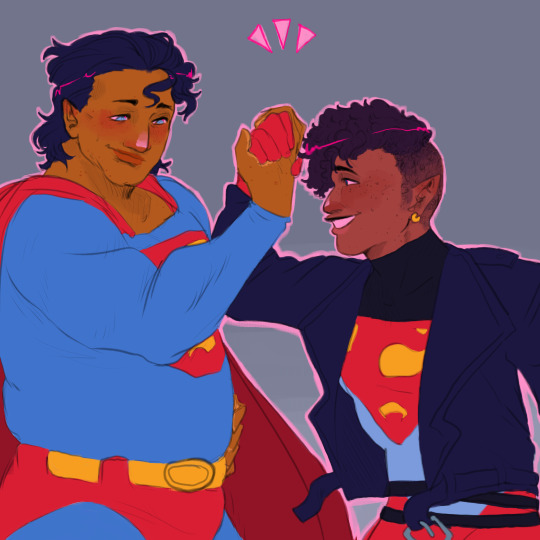
Day 2: Superman / Cadmus @90skonweek
also i doodle sketches during work so im posting them as well bc fun
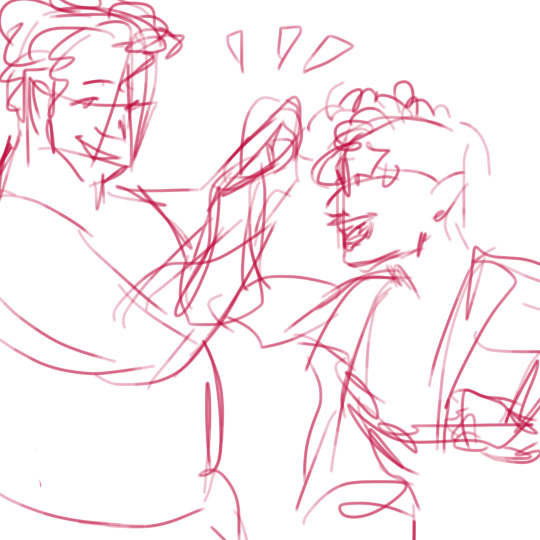
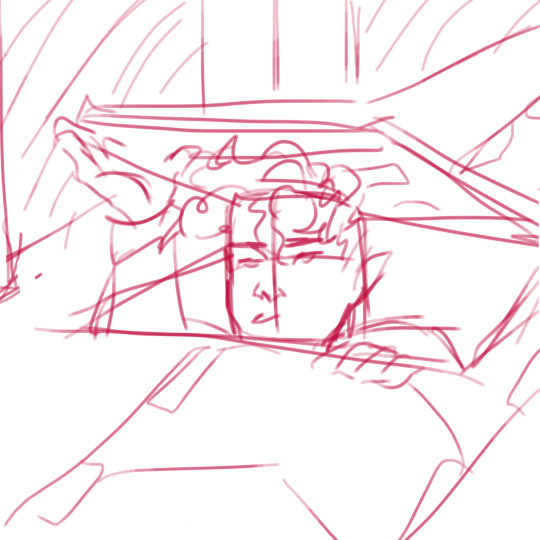
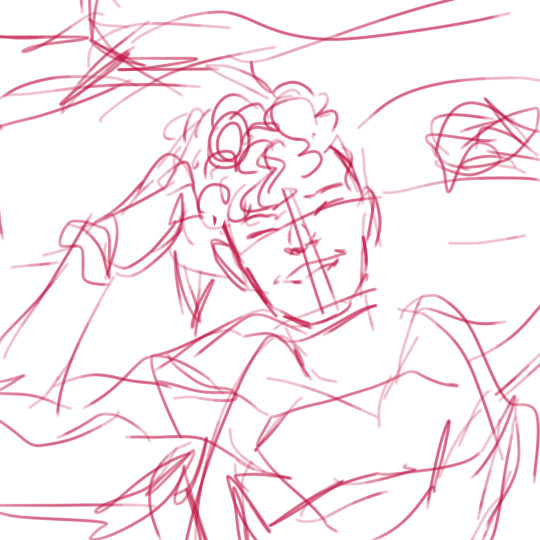
#am i going 2 draw 2 characters 4 every prompt????? pls send help. im taking this 2 literlly i fear#i got....so busy 2day....wth....askhfasjkfh#also ur telling me....I..ME...I MYSEKLF... the angst lover....couldnt come up w/smth angsty 4 this day????..... we dont talk about it#asjfkafjksafk#also ive never like rlly colored in clark b4 so like uhm..........#yeah idk whats going on here KJASHFJKAHLFWA#whenever i draw him again im going 2 prolly change him a bit lol#ANWAYYS I MISS LONG HAIREDD KAL I MISS HIM#SO IM HAPPY I GOT 2 DRAW HIM#ALSO IN MY HEAD IN MY HEAD#kal is vry rosey cheeked ty ty#heheheeee#ok im done rambling srry#90s kon week#kal el#superman#kon el#superboy#puppee art
164 notes
·
View notes